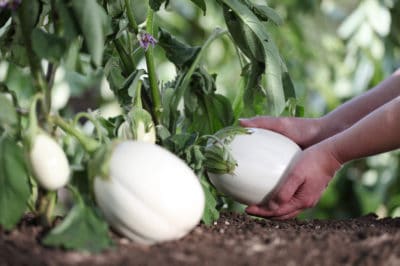How Long Does It Take Eggplant to Mature?
If you live in a warm climate, such as U.S. Department of Agriculture hardiness zones 9 through 12, then you can grow eggplant as an herbaceous perennial, which will come back each year. However, the most common way to grow eggplant is as an annual during the summer months in USDA zones 4 through 10.
If the weather conditions are right, eggplants ripen from 65 to 80 days after planting your seedlings. The maturing time depends on the eggplant variety. When growing eggplant from seeds, you can expect them to mature in 100 to 120 days.
What Are the Signs of Ripe Eggplant?
Young and tender eggplants have the best flavor. When you harvest eggplants before they reach their maximum size, it encourages more to grow. This extends your growing season, giving you more delicious eggplants.
There are several ways to tell if your eggplant is ripe:
- Glossy skin color
- Firm, unblemished skin
- One-third to two-thirds of mature size
- Velvety, green stem
- Skin squeaks when rubbing two eggplants together
When Is Eggplant Overripe?
If the color of your eggplant appears dull, and the skin is wrinkled or loose, then it’s overripe. Another method to see if your eggplants are past their prime is to press your finger gently into the skin. If it leaves an impression or feels squishy, then the eggplant is overripe. If you tap on the eggplant and it sounds hollow, then the flesh is dry and old. When eggplants grow too large or are left on the vine too long, the flavor becomes either bitter or tasteless.
How to Store Ripe Eggplants
Try to eat your eggplants right after you pick them because they don’t stay fresh for very long. If you store eggplant in the refrigerator, they should keep for up to a week. When storing them at room temperature, they’ll only last for a day before getting spongy.
